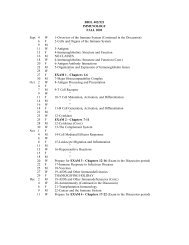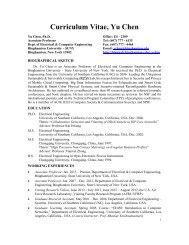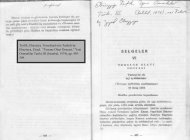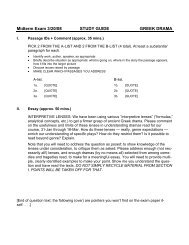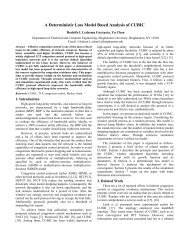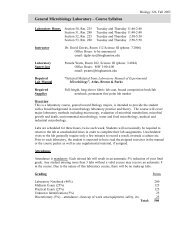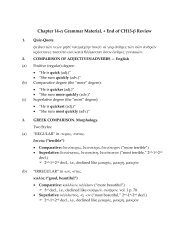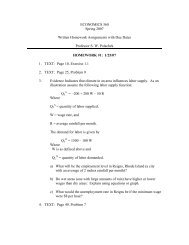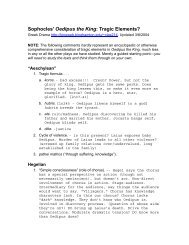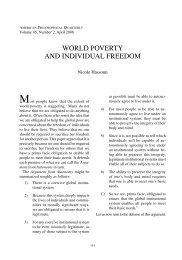Aristotle Poetics - Harvey.binghamton.edu
Aristotle Poetics - Harvey.binghamton.edu
Aristotle Poetics - Harvey.binghamton.edu
Create successful ePaper yourself
Turn your PDF publications into a flip-book with our unique Google optimized e-Paper software.
<strong>Aristotle</strong> <strong>Poetics</strong> 17<br />
stance Haemon and Creon in Antigone. 78 Next after this comes the actual perpetration of<br />
the deed meditated. A better situation than that, however, is for the deed to be done in ignorance,<br />
and the relationship discovered afterwards, since there is nothing odious in it,<br />
and the recognition will serve to astound us. But the best of all is the last; what we have<br />
in Cresphontes, for example, where Merope, on the point of slaying her son, recognizes<br />
him in time; in Iphigenia, 79 where sister and brother are in a like position; and in Helle,<br />
where the son recognizes his mother, when on the point of giving her up to her enemy.<br />
10<br />
This will explain why our tragedies are restricted (as we said just now) to such a small<br />
number of families. It was accident rather than art that led the poets in quest of subjects to<br />
embody this kind of incident in their plots. They are still obliged, accordingly, to have<br />
recourse to the families in which such horrors have occurred.<br />
On the construction of the plot, and the kind of plot required for tragedy, enough has now<br />
been said.<br />
15<br />
20<br />
Concerning temperament (ethos), there are four points to aim at. First and foremost, that<br />
they shall be good. There will be an element of temperament in the play, if (as has been<br />
observed) what a personage says or does reveals a certain moral purpose; and a good element<br />
of temperament, if the purpose so revealed is good. Such goodness is possible in<br />
every type of personage, even in a woman or a slave, though the one is perhaps an inferior,<br />
and the other a wholly worthless being.<br />
The second point is to make them appropriate. The temperament before us may be, say,<br />
manly; but it is not appropriate in a female temperament to be manly, or clever.<br />
The third is to make them like the reality, which is not the same as their being good and<br />
appropriate, in our sense of the term.<br />
30<br />
The fourth is to make them consistent and the same throughout; even if inconsistency be<br />
part of the person before one for imitation as presenting that form of temperament, he<br />
should still be consistently inconsistent. We have an instance of baseness of character, not<br />
required for the story, in Menelaus in Euripides’ Orestes; of the incongruous and unbefitting<br />
in the lamentation of Odysseus in Scylla, and in the speech of Melanippe; and of inconsistency<br />
in Iphigenia at Aulis, where Iphigenia the suppliant is utterly unlike the later<br />
Iphigenia.<br />
The right thing, however, is in the character-portrayals, just as in the incidents of the play,<br />
to endeavor always after the necessary or the probable; so that whenever such-and-such a<br />
personage says or does such-and-such a thing, it shall be the probable or necessary outcome<br />
of his or her temperament. And whenever this incident follows on that, it shall be<br />
either the necessary or the probable consequence of it. From this one sees (to digress for a<br />
78 In Sophocles’ Antigone, Haemon, Creon’s son, nearly, but does not quite, kill his<br />
father.<br />
79 Euripides’ Iphigenia among the Taurians.



